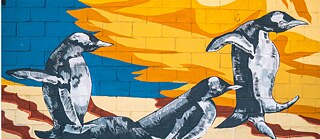Canal Río Churubusco s/n, Área Federal Central de Abastos, Iztapalapa
"The new camels" by Oceane Isla
The “Central de Abastos” is the largest food market in Latin America. A city within a city, it sells not only vegetables, but also flowers and kitchen utensils. It also boasts its own hotel – plus a movie theater!
To add some color and life to the walls that surround this emporium, the Central de Muros was created, giving various mural artists the opportunity to express their art. One of them is Oceane Isla, who gave her project an environmental relevance for the competition: “When I was chosen I was very happy to have the chance to paint at such an emblematic place as Mexico City’s central market”, she explains.
Entitled “The new camels”, her work depicts a number of desert sand dunes in reddish, yellow, and violet shades. Several black-and-white penguins are crossing the sand of this hot eco-system.
“The mural began with the idea that humans have the ability to adapt in extraordinary ways. We are scattered all over the planet and live and survive in completely different climatic zones. I realized that this ability of ours to adapt is probably one of the key reasons why we dominate and influence the Earth. Just like us humans, animals will also have to adapt to the changes that have already been set in motion if they are to survive”, she explains.
This idea was the starting point for the work “The new camels”. It is about the necessity of survival, using penguins as an analogy – they become the new camels that leave the icy eco-systems which are their natural habitat in order to survive in the desert, an entirely different environment.
“I came to Mexico to do a kind of voluntary social service with the Tomate collective while still studying at the L'institut Nacional des Beaux Arts de Toulouse. This was when I painted my first mural as an adult, in Mexico City. Some years later I decided that I wanted to earn my living as a mural artist and painter”, she explains.
However, it was not new for her to immerse herself in this art form; from an early age she knew how to hone the talents that would bring her to mural painting:
“I was roughly 14 years old when I did my first wall painting – in the bathroom at home. The walls were covered with fish and dolphins, and it was as if one were diving into the ocean.”
Entitled “The new camels”, her work depicts a number of desert sand dunes in reddish, yellow, and violet shades. Several black-and-white penguins are crossing the sand of this hot eco-system.
“The mural began with the idea that humans have the ability to adapt in extraordinary ways. We are scattered all over the planet and live and survive in completely different climatic zones. I realized that this ability of ours to adapt is probably one of the key reasons why we dominate and influence the Earth. Just like us humans, animals will also have to adapt to the changes that have already been set in motion if they are to survive”, she explains.
I believe that muralism is a practice that greatly helps society. Art, and especially painting, is shut away in museums and galleries and not accessible to everyone, but only to an elite; culture should in fact be truly accessible to all.
Oceane Isla
About the artist
Although she was already active in the art world, Oceane Isla only regarded herself as a mural painter once she began collaborating with a street art collective:“I came to Mexico to do a kind of voluntary social service with the Tomate collective while still studying at the L'institut Nacional des Beaux Arts de Toulouse. This was when I painted my first mural as an adult, in Mexico City. Some years later I decided that I wanted to earn my living as a mural artist and painter”, she explains.
However, it was not new for her to immerse herself in this art form; from an early age she knew how to hone the talents that would bring her to mural painting:
“I was roughly 14 years old when I did my first wall painting – in the bathroom at home. The walls were covered with fish and dolphins, and it was as if one were diving into the ocean.”







